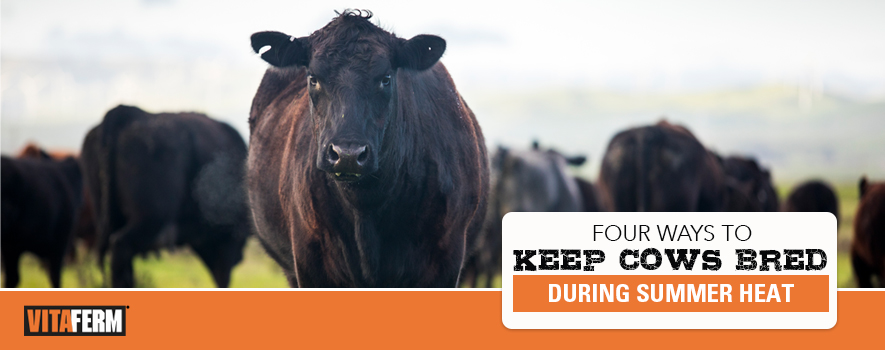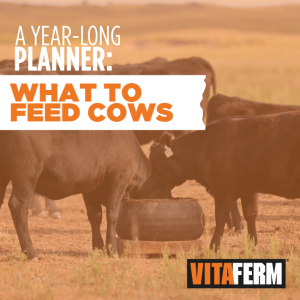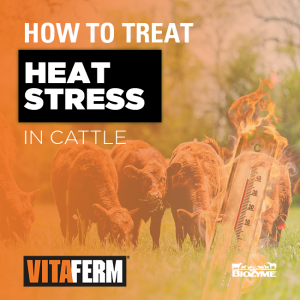The summer heat can zap your energy faster than you can rattle off your favorite cow’s pedigree. A typical day of work will make most people tired but add in extreme heat and humidity and sometimes surviving feels like a job in itself. Imagine being a cow out on pasture, in both lactation and gestation. She’s in the final stages of growing a strapping young calf and the beginning phase of growing her next offspring. And, she is doing this all during the hottest months of the year.
Animals can experience heat stress anytime the ambient temperature reaches 70 degrees or warmer. Add in humidity and that traps the heat, compounding the impact of heat stress. Therefore 80-degree days are different in the Midwest states of Iowa, Illinois and Indiana than they would be in the Mountain states of Colorado and Wyoming.
“When an animal is experiencing heat stress, it has to expend more energy to thermoregulate its body so instead of putting energy toward growing a fetus or providing milk for a calf, she is expending more energy to physically cool herself so she can maintain herself rather that than giving that energy to other stages of production. The cow will always take care of herself first, so she focuses on her own survival before she worries about that fetus growing inside of her,” said Kevin Glaubius, Director of Nutrition at BioZyme® Inc.
Since that bred female is spending so much of her energy trying to cool herself, she often will abort during the summer months. Research has also shown that heat stress delayed puberty in heifers, caused anestrus in cows, depressed estrous activity and increased perinatal mortality.
Glaubius offers four management practices you can use to help get your cows bred and keep them bred during the summer heat.
- Provide a superior vitamin and mineral package. Not only are high-quality vitamins and minerals an essential part of the diet for this stage of reproduction, but good nutrition is vital year-round. The more ideal in body condition (a BCS of 5.5 to 6 is ideal), the more energy that female will have to exert on producing future generations. </p>
One of the hottest minerals available to mitigate heat stress, help get cows bred and keep them bred is VitaFerm® HEAT mineral. VitaFerm HEAT contains three key ingredients to help reduce summer stress factors of heat and insects and help increase performance. Amaferm®, a precision-based prebiotic impacts intake, feed digestibility and nutrient absorption, garlic, to deter insects, and plant extracts help maintain circulation to support animal performance in both heat and fescue situations. In addition, HEAT contains organic copper and zinc for maximum bioavailability to the animal resulting in maintained pregnancy.</p> - Control Insects. Flies and other insects like ticks and lice can be extremely detrimental to your herd health and bottom line. In addition to being a general nuisance, flies will cause cows to bunch up to keep them off the cows. When the cows bunch, they are creating more physical heat and therefore creating more heat stress on the herd. There are several ways to control flies, including using a feed-through mineral, fly tags, fly rubs and dusters and fly sprays. Glaubius suggests that even though all fly control methods are effective, they are most effective when used in a combination of two together.</p>
- Provide Shade and Water. Always make sure to provide fresh, clean cool water to your livestock. Making sure all animals have plenty of water, and water is replenished quickly is imperative to keeping animals cool as well as maintaining herd health. Also, make sure that shade is available so that cattle can get out of direct sunlight during the hottest part of the day. This can be natural shade like trees, a windbreak or temporary shade.</p>
- Avoid Working in the Heat. Ok, maybe you can’t avoid working your herd altogether during the summer heat, but when you do have to work cattle, plan to get your work done early in the morning or later in the afternoon or early evening when temperatures are cooler. Make sure to plan ample time and take it slow as not to put unnecessary stress on the cows.</p>
“Any summer stress in addition to heat, like foot and eye issues, can impact reproductive success. That’s why a quality mineral that addresses heat stress and contains copper, zinc and iodine that helps with foot and eye problems is a wise choice,” Glaubius said.
Following these best management practices combined with a quality nutrition program like VitaFerm HEAT will help reduce heat stress in your cow herd giving them the advantage to maintain pregnancy while helping them remain cool and productive throughout the year.



